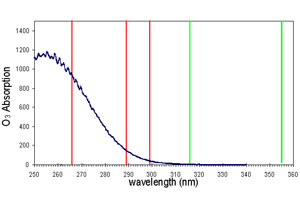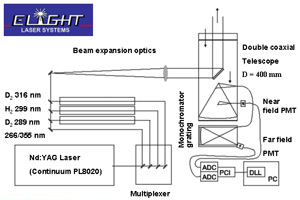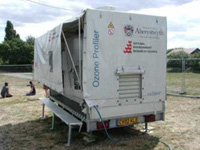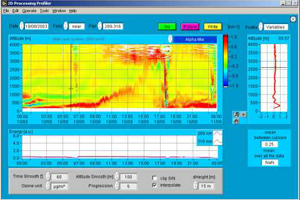Five-wavelength LiDAR
The five wavelength ozone profiler is a compact stand alone differential absorption lidar (DIAL) system designed by Elight uses a Continuum PL8020 Nd:YAG laser in conjunction with a multiplexer to pump Raman shifting cells to produce wavelengths of 266, 289, 299, 316 and 315 nm. The wavelengths 289 nm, 299 nm and 316 nm are generated by stimulated Raman scattering in three respective Raman cells. The 266 nm light beam of the laser pumps the Raman gas cells sequentially by means of a continuously triggering multiplexer. These beams are expanded and emitted into the atmosphere. Backscattered light is collected in a double-coaxial 40 cm diameter telescope allowing measurements in both the near and far field and detected using analogue photo-multiplier tubes.
The system uses five wavelength beams in the UV region two 'on' and three 'off' the absorption cross-section of ozone . The attenuation at these wavelengths is measured and used to calculate the vertical distribution of ozone and aerosols up to altitudes of ~5 km.
Deployment history.
Summer 2003 TORCH, Writtle, Chelmsford.
Spring 2004 TORCH, Weybourne, Norfolk.
Future plans
Operation requirements
| Length x width | 5 x 1.9 m |
| Weight | ~ < 3 tonne |
| Dismantling time | ~ 2 hours |
| Set-up time | ~ 1 day |
| Power requirements | Single phase 230 V 64 A
Three phase |
Specifications of the 5 wavelength lidar
| Ozone Measurement accuracy | ~ 2 ppb |
| Range (dependent on atmospheric conditions) | 200 m to 5 km |
| Altitude resolution | 200 m below 2 km 600 m above 2 km |
Specifications of the Nd:YAG continuum 8020 laser
| Repetition rate | 20 Hz |
| Energy |
|
| Pulsewidth |
|
| Divergence | 0.45 mrad |
| Pointing stability | 30 microrad |
| Power requirements | 220-240 V, 50/60 Hz, 15 Amps, single phase |
| Cooling requirements | 4-8 l/min @ 3-4 bar, 22.3 Co max |

The Five Wavelength Lidar is supported by the NCAS Facility for Ground-based Atmospheric Measurement (FGAM).


